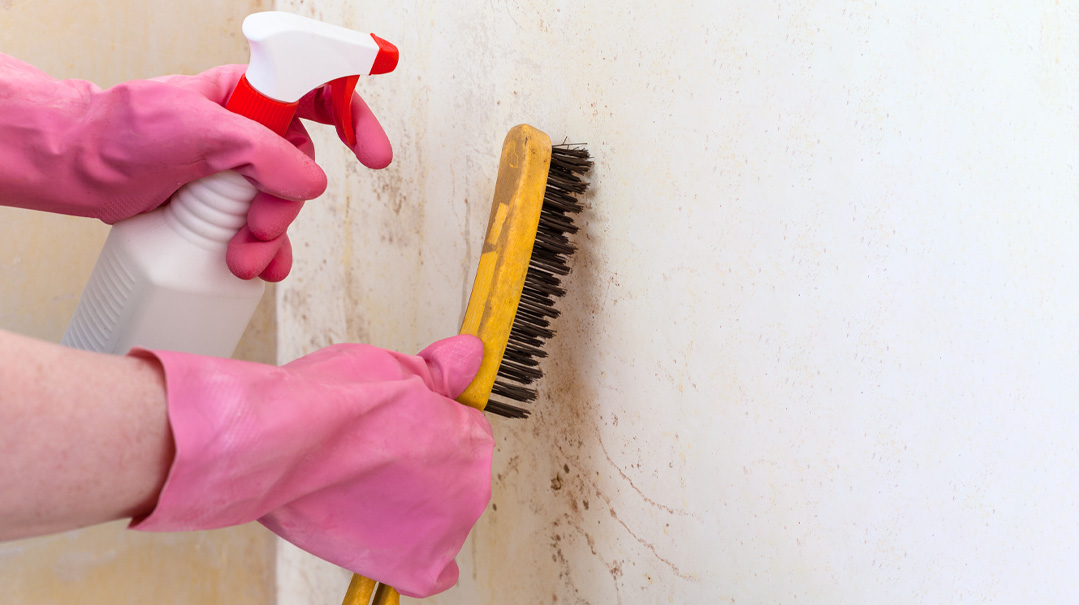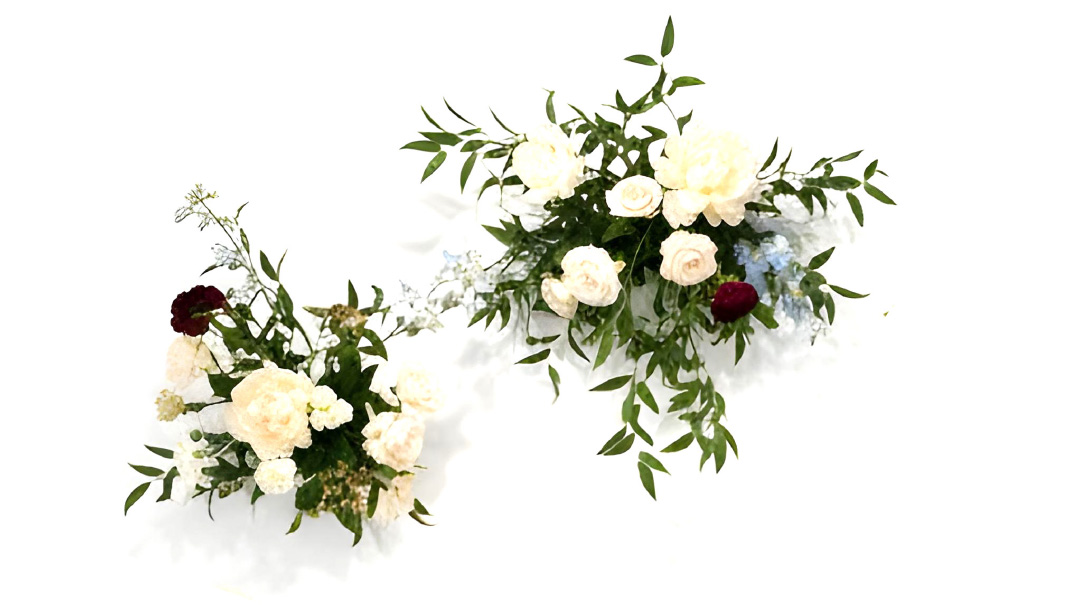Behind the Wall
| October 25, 2022Their home felt warm, magnetic...menacing

IT begins with Duvy, of all people. The Krasner family had moved into their new house almost six months ago, a run-down house in a corner of Brooklyn, which had needed extensive renovating, and Duvy had decided that it was haunted.
Not that the Krasners really believe in haunting or ghosts, but there’s something undeniably odd about the house. A strange rattling in the sink drain had revealed an old necklace. A loose floorboard pried up by the three-year-old had exposed a photo beneath it. Under one radiator, Chavi had accidentally vacuumed up a small ring. The house still seems to carry the presence of a former owner, and eight-year-old Duvy feels they’ve never left.
It’s only natural, then, that when he notices spots appearing on the back of his closet, he doesn’t think anything of it. Strange things are always happening in the Krasner house, and this is just the ghost asserting itself. The spots begin to grow, and Duvy ignores them in the way that he ignores everything about his closet, except the pants that he’d knocked to the floor earlier that week and needs for school.
The spots become larger, meet and bloat, until Mrs. Krasner is putting away laundry one afternoon and parts the sea of grays and browns and greens in the closet. She shrieks, and everyone runs. “It’s the ghost!” Duvy announces, waving dramatically at the wall.
“Oh, it’s much worse than that,” Mrs. Krasner says mournfully. “It’s mold.”
Ayesha Franklin is accustomed to being a fish out of water. She’s always been a little strange, a little too bright, and a little too caustic, but that, she feels, has proven an advantage. Maybe it’s why she’s always challenged herself, has always pushed to flout expectations and to take every obstacle as an invitation.
It might explain why she’s become the rare woman in the mold-removal business. Or why she’s come back to Brooklyn after 30 years away, seeking some thread that she’s never been able to weave into her life. Her grandmother had grown up here, somewhere in a little postwar enclave that Ayesha only vaguely remembers when the bus passes it, and her heart had cried out without knowing what it was seeking.
Her grandmother — “Bubbe,” she’d called herself, though her real name had been Fruma, and Ayesha had gotten strange looks in childhood when she’d referred to her — had lived in her house with an aide even when she’d been in her nineties and had refused to move to the nursing home where Ayesha’s mother had wanted to send her.
Ayesha and her mother had gone to visit her once a week, taking the Q train across the city to venture into that old, musty house. She remembers Bubbe with her light-skinned face and toothless smile just for Ayesha, the way she’d light up and wheel herself to the door when they’d arrive. Bubbe would pluck a candy from somewhere inside the couch and Ayesha would lay it on her tongue and let the sugar seep into her taste buds.
Bubbe would say, I used to love those in the alte heim, with a wistful sort of smile. She’d drop phrases like that sometimes; inevitably, they made Ayesha’s mother grimace. Bubbe liked to talk about the first ten years of her life, before the war, though she rarely discussed the years of the war. Only once that Ayesha can remember. There was nothing after they came. Not food, not clothes, not faith.
Six-year-old Ayesha hadn’t questioned that. Her grandfather, a staunch Protestant, had put up a Christmas tree, and her mother had followed suit. Ayesha had grown up without considering her roots, and it hadn’t been until her mother’s death a few years ago that she’d begun to second-guess it all. Is this what it is, two generations after trauma, to find yourself rootless? Is this all she is now, a woman descended from slavery and concentration camps, a girl with a history that has all but been erased?
So, she’d moved back to Brooklyn and set up her business there, and one day, she’d ventured into the Temple Israel around the corner. Her grandmother’s old street has become part of an Orthodox neighborhood, and Ayesha is leery of overly religious Jews, with their strange clothes and the way that their Jewishness is so overt, like they’d never learned from what had happened to them 80 years ago.
The rabbi at the Temple Israel had welcomed her for a service and had been so encouraging that Ayesha had nearly considered joining. But she’d lapsed within weeks. There were too many eyes on her, too much curiosity and some hostility, and she had been sure that this was another place where she didn’t belong, another piece of her past that was no longer hers.
And that had been it. Ayesha is done with trying, with seeking belonging and whatever it is that her heart still craves. She has been here for three years now, has a fairly successful mold-removal business, and that is enough for now. She feels herself floating sometimes, searching, but she doesn’t know what she is seeking or where she will find it.
Certainly not in this, a call one Wednesday morning from a woman named Sarah Krasner with one of those Orthodox Jewish accents, loud and frantic.
“The mold is all over the back of the closet,” she says. “I don’t know what we might have been inhaling — I had smelled it, but Duvy’s room is right next to the bathroom, and I’d assumed that it was from there—” She clears her throat. “I’d really like to speak to the specialist, if that’s okay.”
“I am the specialist,” Ayesha says, amused. It isn’t the first time that someone has taken her for the secretary. “I can take a look later today and see what you need.”
“Oh, that’d be wonderful,” the woman says, sounding so haggard that Ayesha feels sorry for her. “I’ll give you my address: It’s on Avenue L.” She dictates it over the phone, and Ayesha copies it down and then searches for it on her Maps app.
She blinks at the overhead view of the street. She knows this particular stretch of Avenue L. Quickly, she flicks to the street view, and the house makes a chill run through her. “I—” She clears her throat. “I don’t know if I can—” And she breaks her own rules and says, “Have you tried Mold Removal, LLC? Or Mold Will Fold?” They’re Orthodox companies, she knows, competitors that the Orthodox Jews always use.
“I tried them,” the woman admits. “But no one else can come on such short notice. You can help, right? Please,” she says, her voice rising. “It’s the whole wall.”
That house. Bubbe’s house, with all the memories and the old longing that will follow. But the woman is desperate. “Yes,” she says. “I’ll be there.”
She pulls on her protective gear, gets into her truck, and drives over.
The Krasners are exactly what she’d expected. There are so many children underfoot that Ayesha can’t quite count them, and the mother looks harried but sweet. She is small, and Ayesha towers over her in her protective gear in a way that many women find intimidating.
Sarah Krasner just looks relieved. “Thank you,” she says, as she hurries Ayesha into the house that had once been Bubbe’s. Ayesha recalls it as big and empty, full of old, musty rooms, but it’s smaller than she’d remembered, cramped and alive with crayon-decorated walls and children shrieking.
“Duvy’s room is upstairs. Baruch Hashem that Yitzy is away in yeshivah now or we’d have two kids breathing in those fumes. Can I offer you something to eat? Drink?”
Ayesha shakes her head. “Mold first,” she says, and she climbs familiar stairs — with the same exact creaking that she recalls — up to a room with a bunk bed against one wall and stacks of kids clothing on a dresser. The closet door is tightly shut, and Ayesha tugs at her mask to make sure it’s secure before she opens it.
It’s bad. It’s one of the worst cases she’s seen in a residential home in years. She inspects the wall and determines that there isn’t much she can do to save it.
“The good news is that it’s contained in that room,” she tells Sarah when she returns downstairs. She opens a window before taking off her mask and protective goggles. “The bad news is that the wall has to go. Something behind it is leaking. There’s plumbing that will have to be fixed, and you’ll need a new wall. I do restorations, but it’ll take a few days. This is a one-woman operation.”
Sarah nods slowly. “Whatever it takes,” she says, and she offers Ayesha a plate of fruit and cookies. It’s a little kindness, one that happens only rarely in Ayesha’s business.
It takes her back to childhood, suddenly, to this little kitchen where she used to drink orange juice and listen to Bubbe talk about the alte heim. “Have you done a lot of renovations?” she asks, glancing around the kitchen.
“Had to,” Sarah says, taking a piece of freshly cut melon from the counter. “The house had been basically falling apart for over a decade before we bought it. We couldn’t afford a full redo but we fixed what we could. I guess the contractor missed a leaky pipe behind Duvy’s closet.”
There is something about the way that this kitchen still feels like a faded memory that has Ayesha blurt out, “My grandmother used to live here. In this house, I think.”
Sarah blinks at her. “Your grandmother…” She looks bewildered by this. “How strange. There was a mezuzah on one of the doors when we moved in.”
“Mezuzah,” Ayesha repeats, trying out the unfamiliar word, and she glances at the doorpost of the kitchen, the little rectangular box on it, and she knows it instinctively like a memory from another life. Sarah is kind, but she must look at Ayesha and find it hard to believe that her grandmother could have lived here.
She clears her throat. “My Bubbe,” she says, and Sarah’s eyes go wider. “My mother’s mother. She wasn’t— she didn’t really believe in any of the—” She gestures at the mezuzah, at a loss for words that won’t be offensive. “But I guess she had one of those.”
Sarah is looking at her differently now, a strange, assessing glance that has Ayesha twitching. “I see,” she says slowly. “I didn’t realize that you were Jewish.”
“Oh, barely,” Ayesha says, waving her hand uncomfortably. “I mean, I tried going to a temple here once, but it didn’t work out. I was raised Protestant,” she offers, trapped in a stream of babble. “I just remember—” She motions at the house, and she feels abruptly lost in her own skin, without the words to explain the mess of confusion she feels about being called Jewish.
This is about mold, not her roots. She takes a breath, eats a cookie, and sees Sarah’s eyes soften as she makes an excuse and returns to her work.
BY the next day, the room is covered in protective tarps and Ayesha is running filtration systems through it to flush out the fumes. It’s hard work, and she’s exhausted once she’s managed to cut through the wall and remove most of the mold. The job is larger than she’d anticipated — it isn’t a pipe behind the wall that’s the problem but an imperfection in the roof.
“I can’t fix the roof,” she tells Sarah. Today, the husband is home, a black-hatted rabbi with a red-brown beard who squints up at the ceiling and frowns. “What I can do is wait until you can get it patched, and then I’ll put up a new wall.”
“I know a guy,” Rabbi Krasner offers. “He won’t be able to do it Friday, but I can talk him into coming Sunday to take care of the roof. Are you available Monday?”
Ayesha nods. She has some routine inspections scheduled for Monday, but she’ll put them off for the Krasners. There is something about this house and this family that makes her want to make them comfortable as soon as possible.
Maybe it’s the fresh fruit and cookies, again, and the way that one of the daughters keeps leaving ice-cold water bottles outside the room in case Ayesha has somehow finished the five others she left earlier. Maybe it’s the memories, more of them flooding her with every moment she is here.
They’re the only explanations for what happens next. Sarah exchanges a glance with her husband before she ventures, tentative. “We’d really like to have you for a Shabbos meal tomorrow night, if you’re interested.”
And Ayesha, for no particular reason, says, “I’m interested.”
She isn’t interested. She had tried going to that temple, had tried exploring her heritage, and she’d crashed and burned. She doesn’t want any part of it, doesn’t need it.
But Sarah seems so happy about it, and she gives her a time and a quick overview of what the meal entails, and Ayesha doesn’t have the heart to rescind her acceptance of the invitation.
She knows that she should dress formally and as modestly as the women in the Orthodox community do, and she doesn’t have a dress that suits. Instead, she pulls on long pants and a high-cut shirt and hopes for the best. She drives over just before sunset and parks down the block, immediately self-conscious at the stares of children playing in their front yards.
This is a mistake. This is putting herself in a situation that promises to be agonizing for hours. She stops at the path up to the house, frozen in indecision.
The house. Bubbe’s house. Bubbe hadn’t been observant, of course, not after the war, but when they’d come to visit on Saturdays, she’d always had a little white circle of gefilte fish for lunch, a little bit of chicken. Bubbe had always turned her nose up at bacon, Ayesha remembers. I might not have faith, but I’m still Jewish, she’d said, making a smacking noise with her lips. Feh.
What would Bubbe think of her today, with the foolish idea that this might be something real?
She takes a few steps forward, striding as quickly as she can so she can’t second-guess herself, and one of the little Krasners opens the door and beams at her.
“Hi, Ms. Franklin!” she says. “Shiri got into the mold room earlier but don’t worry, we locked the door so she won’t be able to do it again. We didn’t know she could reach the doorknob!”
Ayesha smiles at the girl, bedecked in a long gown and her hair loose and shiny, and she breathes. “I don’t think a few seconds should be a problem,” she says.
“Come in! Everyone’s here,” the Krasner girl says, and she leads Ayesha to the couch.
To her surprise, there are two other women there who aren’t Krasners. Both are white, and one is wearing pants, the other in a dress too short for this house. Neither looks observant, and Ayesha is relieved to realize that she isn’t alone here. The women’s eyes flicker over her, taking in everything from the stiff, barely worn blouse to the color of her skin, and they nod to her as though they immediately understand.
“The Krasners work in kiruv,” the woman in pants says, a word Ayesha had never learned from Bubbe but nods at anyway. “I’ve been here a few times before.”
Sarah comes to sit with them, and it really isn’t bad. The tension that Ayesha had anticipated is hardly present, the conversation easy and flowing. They chat on the couch about their jobs and their backgrounds, and the other two women are amazed at the revelation that Ayesha’s Bubbe had lived here. “That’s the Hand of G-d right there,” one of the women says, and Ayesha has her guard down just enough that she laughs and nods.
Rabbi Krasner returns home with a slew of boys, and Duvy scrambles to sit next to Ayesha and proclaim to everyone that she’s the one who broke his closet. The food is good, and Ayesha enjoys the singing, the conversation, the little lessons that Rabbi Krasner introduces about the Bible. Torah. They’re small and thoughtful, and she presses for more, questions him on what he says until she’s satisfied with the answers.
By the end of the meal, the children have departed — most to sleep, some to stretch out on the couch and read a book, and Ayesha looks around the room, satisfied and a little sleepy. Bubbe would be thrilled to see all these children in her house, she decides. All these little Jewish children, in touch with their heritage, celebrating Sabbath together.
Bubbe had rejected so much of the past, but she’d still called herself Bubbe, hadn’t she? She’d still had nostalgia for a past that Ayesha hardly understands.
Tonight, she grasps it a little better, and she is surprised at how enchanting it is. The people here have meaning, have purpose, have all the things that Ayesha has craved. They believe without reservation, even the other two non-Orthodox visitors, and they are filled with enthusiasm for faith and learning, for this culture that is ancient but still vibrant. The Krasners are a window into another life for Ayesha, into the world as it could have been for her.
Into the world as it could still be. The thought has her heart racing. No. She isn’t going to do this. She’s sensible, smart, and this would be a stupid, terrible thing to do. So, what if the Krasners have purpose? Doesn’t she have purpose, too? So what if the Torah they’d discussed has resonated somewhere within her? It’s archaic, from a time even Bubbe had left behind. There is no reason to stay and learn more, to grow enamored with this house and this heritage.
What is she doing?
She stands abruptly, her chest still vibrating with her fears, and her companions turn to look at her inquiringly. “I have to go,” she says, her voice choked. “Thank you for— thank you for everything.”
She makes a mad dash to the door, Sarah hurrying behind her to keep up. “Ms. Franklin,” she says. “Ayesha. I hope we didn’t make you uncomfortable—”
Ayesha turns, hasty in her desire to escape without hurting the Krasners. “No,” she says swiftly. “No, this was — it was wonderful. I’m just not… this isn’t for me.” She is breathing fast, is overwhelmed at the lights and the laughter still filtering in from the dining room. “I’m sorry. I have to go.”
She flees in a rush, blinking back tears that had sprung up from nowhere as she escapes this magnetic, menacing home.
She is apprehensive about returning on Monday, to facing the scene of her humiliating escape. The weekend is spent in strange agony, reaching for her phone and considering: What if I just typed in a few questions… would it be so bad if I just… but she stops herself every time.
Whatever she had felt at the Krasners had been an aberration, a blip that doesn’t need to change anything. It had been an experience. Just an experience. It didn’t need to be earth-shattering.
But she has a job to finish. Sarah had called her on Sunday afternoon to let her know that the roof was being patched. The back wall has to be cleaned and replaced, and she drags herself to the Krasners on Monday morning, relieved when no one mentions what had happened Friday night.
Instead, there is Sarah with her plate of food. Ayesha doesn’t need protective gear today now that the mold is gone, and Sarah comes into the room to chat while Ayesha works, a welcome distraction from the muck that Ayesha finds caked in behind the wall.
And then Sarah says casually, “You know, we do a lot of those Friday night meals.” Ayesha squeezes her eyes shut, struggles to focus on the dirt instead of the conversation. “They don’t have to be anything more than that. I’ve had women come for years — even in our old apartment — and that’s their only real Jewish moment of the week. It’s an excuse for good food and conversation. If I do say so myself.” Ayesha feels a bit of tension seep from her skin.
“I don’t think so,” she says. “Not about the food,” she adds hastily, desperate not to offend. “But I just… I’m not really Jewish, you know? Not really. Do I look Jewish to you? Do I sound Jewish?”
“There’s no right way to look or sound Jewish,” Sarah says, unmoved.
Ayesha shakes her head. “It’s not for me. It’s not something I want.” She tosses another pile of debris into a can, and she winces at a filthy-looking ziploc bag left beneath it. She picks it up to toss it into the can, too, and then pauses. “There’s something in here,” she says, squeezing at the bag with her gloved hands.
Under the grime, there is something small and rectangular, the size of a deck of cards. Carefully, she cracks the bag open and then slides her glove off to remove the item.
Sarah leans forward. Ayesha frowns. It’s a fat little book with Hebrew words on the front, and she slides off her other glove to inspect it. Despite the mold and the filth dripping into the wall over it, it’s been preserved in the bag, and it only looks weathered with age and time. “Were you missing this?” she asks, passing it to Sarah.
Sarah shakes her head. “I’ve never seen it before,” she says, and then, in explanation, “It’s a prayerbook. I wonder—”
Carefully, she eases it open, holding it with some reverence. Ayesha watches her, eyes glued to the book, something in her stomach fluttering violently against its sides.
Sarah says, “There’s a name.” Ayesha stands very still. It is suddenly utterly vital that she knows which name is written inside. It would make such sense, be so obvious, if—
Bubbe had hidden things away, secreted them in corners of the house. And this is a sign. This is her grandmother’s prayerbook, hidden away along with every little thing that Bubbe had ever owned. But this isn’t a morsel of food or a piece of glitzy costume jewelry. This is from before — from the alte heim — from Bubbe’s childhood. This is the Hand of G-d, showing her where she belongs, no matter how hard she’s tried to fight it.
But Ayesha can’t read the name. The writing inside is different, not quite the Hebrew that Ayesha had recognized on the cover, and Sarah reads it in Hebrew, then translates it. “To my dear Chanale on your tenth birthday,” she says quietly. “There’s also a pasuk — a piece of Scripture. ‘Yehi chasdecha Hashem aleinu ka’asher yichalnu Lach — May God’s kindness always be upon us…’ ” She looks up. “Was your grandmother’s name — oh.” She hesitates.
Because Ayesha is frozen in place. Chanale. Not Bubbe, after all. The realization makes her legs buckle, makes the disappointment hit like crashing waves against her tentative approach.
But Sarah places the prayerbook into Ayesha’s hands, unaware of the storm that roils through Ayesha, her eyes questioning. Ayesha clutches the prayerbook anyway. She is anchored in this stormy sea by a book in a language she doesn’t know, by memories that have kept her orbiting this house in Brooklyn, by a history so rich that it draws her in effortlessly.
“No,” she manages. “That wasn’t my grandmother’s name.” But her fingers are around the book in a vise grip, and she can’t seem to let go of it. This isn’t Bubbe’s. This is another woman’s prayerbook, with another untold story within it. The instant connection she had felt with it had been just a mirage.
Yet severing that connection is suddenly anathema to her. She’d wanted this prayerbook to be a sign. She’d desperately wanted that Hand of G-d, stretching out and saying: Here. This is where you belong. Tears spring into Ayesha’s eyes, and she can’t blink them away in time.
“That Friday night invitation is still open,” Sarah says gently. Her gaze is sympathetic and warm, and the prayerbook is heavy in Ayesha’s hands.
“Okay,” Ayesha says, her heart beating fast and sure in her chest. “Okay.”
(Originally featured in Family First, Issue 815)
Oops! We could not locate your form.







